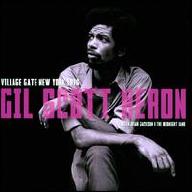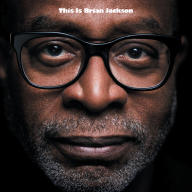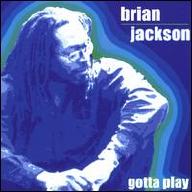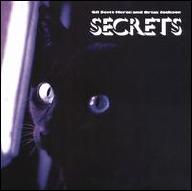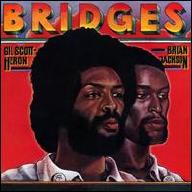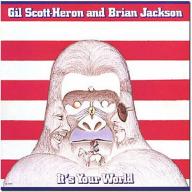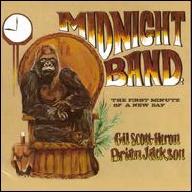Jackson was born in 1952 in Brooklyn's Bedford-Stuyvesant neighborhood, the son of Clarence and Elsie Jackson -- his mother was an amateur pianist and a librarian at the Ford Foundation, and his father was a New York State parole officer. Both were jazz fans and, according to an interview, played music almost constantly in the house. Jackson's parents separated when he was five and he moved to Crown Heights with his mom. They lived in a one-bedroom apartment until she remarried in 1968. During this time, Jackson began studying piano with his mother's teacher, Hepzibah Ross. When his mother told his teacher she had to discontinue lessons for financial reasons, the teacher awarded Jackson a scholarship for his musical prowess. Between 1965 and 1969, he attended Brooklyn's Erasmus Hall High School, where he participated in school music programs, met other musicians, and played in his own early bands.
At 17, Jackson entered Pennsylvania's Lincoln University, a school he chose because poet Langston Hughes had studied there. One afternoon in a music department practice room, he was introduced to Gil Scott-Heron, then a 19-year-old English major who had also chosen to attend Lincoln because of Hughes. Scott-Heron was already a published poet and working on Vulture, his first novel. He also played piano. Scott-Heron had written a composition for a fellow student (Victor Davis, a future member of the Midnight Band) to sing at a talent show. Davis asked Jackson to play piano on his rendition of the standard "God Bless the Child." Jackson also heard Scott-Heron's original song "Peace" that afternoon and was knocked out by the lyrics. He asked the composer if he could put lyrics to his own compositions. They forged a decade-long musical partnership then and there.
In 1970 Scott-Heron released Small Talk at 125th Lenox on Flying Dutchman, a live spoken word record to complement his poetry collection. As he and Jackson began writing, they approached label head Bob Thiele about returning to the studio with a band. Thiele agreed and hired a first-rate band that included bassist Ron Carter, saxophonist and flutist Hubert Laws, and drummer Bernard Pretty Purdie. The sessions were arranged and conducted by Johnny Pate. Jackson co-wrote more than half of Pieces of a Man, including the title tune and what many consider the first neo-soul track "I Think I'll Call It Morning."
Interestingly, Jackson was deeply attracted to the sound of the Fender Rhodes electric piano's sound. He followed Herbie Hancock, who had used it with Miles Davis and with his Mwandishi band. Because of that, however, Jackson resisted playing it because he was intent on developing his own sound. To that end, he purchased a Farfisa Professional. While recording the song "Speed Kills" for 1972's Free Will, he drifted over to the Rhodes and discovered its unique capabilities for his own music. From that moment on, he adopted the instrument alongside his acoustic piano.
The pair recorded the seminal Winter in America for Strata East in 1973. Their first co-billed outing, they cut it in a Maryland studio and self-produced it for aesthetic reasons. It marks the true beginning of the sound they would develop and tour with for the next seven years. Though distribution was limited in America, the single "The Bottle" got national airplay and propelled the album to number six on the jazz album chart. It sold more than 300,000 copies and earned them a deal with Arista. Though the pair shared writing and production duties, label boss Clive Davis only saw Scott-Heron as a primary artist, but he fought for Jackson's name to be alongside his own and won. First Minute of a New Day was released in January of 1975. Its meld of neo-soul, funk, and spiritual jazz registered in songs that addressed spirituality, oppression, revolution, and personal transformation. It peaked at number five on the jazz albums chart and landed inside the Top 100 at pop. After a promotional tour, the Midnight Band re-entered the studio in June and over the next month cut From South Africa to South Carolina. Also self-produced, it netted the smash club single "Johannesburg." The set transcended the jazz charts and placed in the top half of the Top 200, earning Scott-Heron, Jackson, and the Midnight Band a performance slot on Saturday Night Live in December.
Two-thirds of the double-length It's Your World that followed in November of 1976 was recorded live in Boston the previous July. The remainder was cut in a pair of studios. While it didn't register on the Jazz album charts, the set made the most of its Bicentennial theme and hit the Top 200; it is widely considered one of the pair's finest offerings. (Once again, Jackson had written the title-track set-opener.) After touring the globe, the Midnight Band returned to the studio that summer and cut Bridges. Released in September, it featured the single "We Almost Lost Detroit," which was based on John G. Fuller's book-length journalistic account of a nuclear accident at the Fermi II nuclear plant in Michigan. The set placed at 16 on the Jazz albums chart and also made the Top 200. The song became an international hit and an anthem for the no-nukes movement; the band played plenty of No Nukes shows until their split in 1980. Along with It's Your World, it remains one of Jackson's personal favorites from his time with Scott-Heron.
The Midnight Band were busy. They were touring almost constantly and when they weren't, Jackson and Scott-Heron were writing. In April, they entered a Santa Monica studio and emerged a month later with Secrets. Issued in September, its funky lead single "Angel Dust" charted at R&B, as did the album, and also registered their group's highest Top 200 placement at 61 and peaked at 11 on the jazz album charts. Across 1978 and all of 1979, Gil Scott-Heron and Brian Jackson, along with the Midnight Band, stormed the world's stages from the Hollywood Bowl to the Montreux and Tokyo Jazz Festivals. The long tours exacerbated creative, business, and personal tensions between the two men.
In August of 1979, Scott-Heron and Jackson entered the recording studio with co-producer Malcolm Cecil and an all-star cast of jazz players who included drummer Harvey Mason, trombonist Bill Watrous, and guitarist Marlo Henderson. Tensions grew as Scott-Heron claimed more of the songwriting credits, with Jackson relegated to the role of multi-instrumentalist and arranger. An over the top funk record, the abundance of its electronics thrilled Jackson -- who saw them as possibilities for jazz improv -- and alienated Scott-Heron, who wanted to stick to core soul and R&B roots. The only song the pair wrote together was "Corners." Led by the anti-nuke single "Shut Um Down," the set charted inside the Top Ten at jazz and R&B and peaked at 67 on the Top 200. After a brief, painful tour Jackson left the partnership.
The following year, Jackson played keyboards alongside producer Eumir Deodato on Kool The Gang's Something Special, and toured with Stevie Wonder and Earth Wind Fire. In 1982 he contributed the funky soul track "Step in the Light" to Sunfire's eponymously titled debut album. In 1988 he co-produced Will Downing's wildly successful debut album and contributed several songs to the set, including the smash single "In My Dreams." He also played on Roy Ayers' Drive that year and worked with him on tour. He also co-produced and played on Downing's Come Together as One in 1989.
Jackson's cachet was rising. In addition to working live all over the world with a wide variety of artists, he produced Gwen Guthrie's final Reprise outing, Hot Times, in 1990 while continuing to work with Downing. He was spending the lion's share of his time in the U.K. and Europe; he produced Aja's debut 12" for Expansion Records in 1992 and wrote music for Oneness of Juju. In 1994, he co-wrote "Spirits Past" from Scott-Heron's comeback record Spirits. (Interestingly, future collaborator Ali Shaheed Muhammad also worked on Spirits.) Expansion eventually licensed and re-released several of their earlier albums. Jackson continued to spend a lot of time in Europe. In 2000, he released his own solo debut album, Gotta Play. Alongside a cast of capable younger musicians, he enlisted Roy Ayers to contribute vibes to a few tunes, including a cover of the Gap Band's "Outstanding." Another selection, "Parallel Lean" (which utilized parts of "Home Is Where the Hatred Is") featured Scott-Heron. Issued by the tiny RMG (Roberts Music Group), it vanished from the marketplace in the U.S. before most people heard it.
Jackson stayed busy playing gigs with many bands across Europe. He gigged with Ayers in London and in France and assembled his own jazz-funk improv groups. In 2006 he collaborated with guitarist Eugene Chadbourne and the Violent Femmes' Brian Ritchie and Victor DeLorenzo on the privately issued Get G.O.I.N., and a year later appeared with Alabama 3 on M.O.R. In 2008 he played flute on the Scallions' Sounds of Vinyl and the Past, and had his rhythm tracks and vocals abundantly sampled on the [One] Nation album The Long March. In 2008 Jackson recorded with the pickup band the Jack and Jim Show for 2008's Think 69, alongside Chadbourne, banjo master Tony Trischka, former Frank Zappa drummer Jimmy Carl Black, and others. In 2009, he served as pianist on Jenni Muldaur's Dearest Darlin'. Jackson also played several tributes to Scott-Heron after his death in 2011.
In 2013, Jackson co-produced, arranged, and played on Kentyah Fraser's Scott-Heron/Jackson tribute outing, Evolutionary Minded on Motema. The program was exclusively composed of extensively reworked tracks by Jackson and Scott-Heron, and performed by a star-studded cast that included drummer Stanton Moore, Chuck D, Gregory Porter, Juma Sultan, Mike Clark, Bill Summers, Abiodun Oyewole, and Airto. The following year he worked with Porter on the singer's Issues of Life: Features and Remixes. After session work with a wide variety of independent artists over the next several years, he resurfaced as pianist and keyboardist on Charnett Moffett's globally acclaimed Motema release Bright New Day and toured with him.
In late 2019, Jackson began woodshedding with producers and multi-instrumentalists Ali Shaheed Muhammad and Adrian Younge. According to the former, Jackson was instrumental in influencing the aesthetic and direction for their Jazz Is Dead label; in fact, he cut the first full-length for it. Their first released track together, "Nancy Wilson" appeared on JID001 in early 2020. That summer Jackson created a podcast called Pieces of a Man with Ohio prisoner and death row inmate Keith LeMar (who is still trying to prove his innocence). They recorded eight episodes through January of 2021. Though recorded first, Jackson's volume in the bi-monthly JID series appeared in August 2021 as Brian Jackson JID008. The eight-track set was entirely composed, produced, and performed by the three men with drummer Malachi Morehead joining the sessions.
Jackson had begun sketching a solo album while recording Bridges with Scott-Heron back in 1976, going so far as to record a few demos. Those plans were scuttled as the Midnight Band's touring engagements multiplied. He mentioned them to the Phenomenal Handclap Band's Daniel Colla´s, who immediately began wondering what producing such an album would sound like. Determined to find out, he and the pianist began a series of twice weekly sessions over 11 months in Colla´s' Williamsburg, Brooklyn studio. He enlisted guitarist and bassist Binky Brice (Billy Ocean, Evelyn Champagne King, Roy Ayers), occasional writing partner Morgan Phalen, Latin Grammy-winning flautist Domenica Fossati, drummers Moussa Fadera and Caito Sanchez, and Phenomenal Handclap Band mates Juliet Swango and Monika Heidemann. Lyrics emerged while the pair relaxed imbibing coffee and exotic whiskeys after recording sessions. The end result, This Is Brian Jackson, was released by BBE in May 2022. ~ Thom Jurek, Rovi



